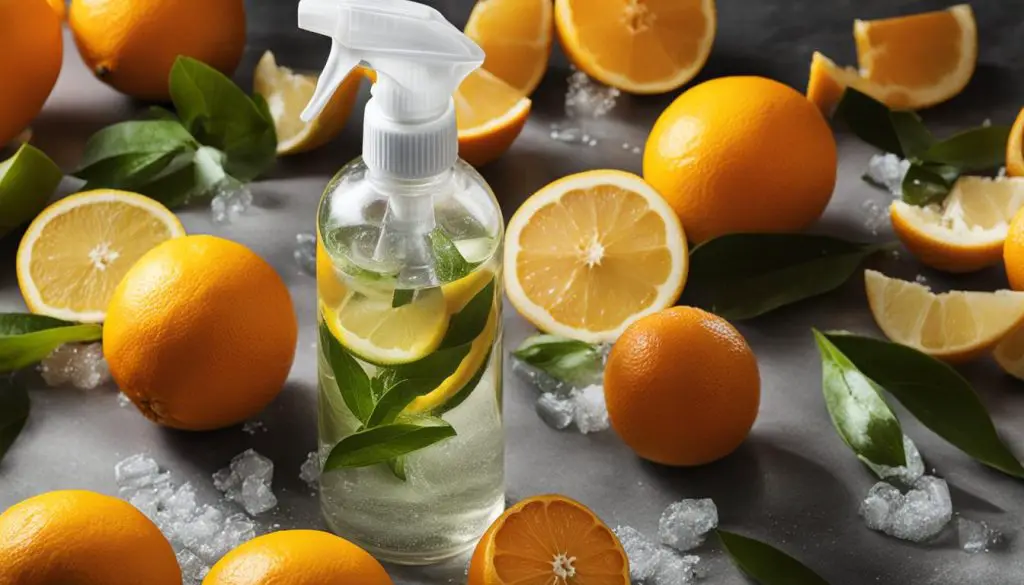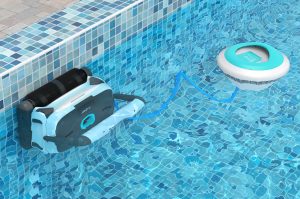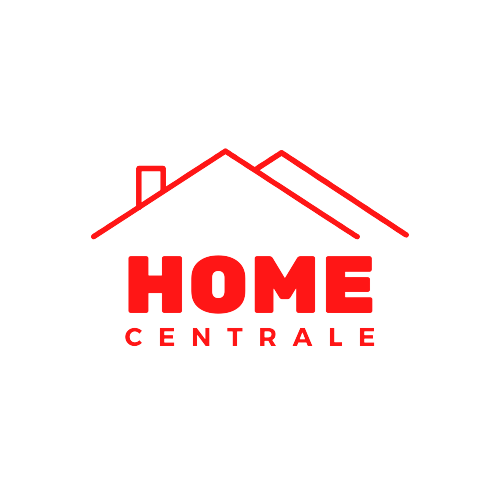Welcome to our guide on how to make a natural floor cleaner at home. If you’re looking for a cost-effective and eco-friendly solution to keep your floors clean and fresh, then making your homemade floor cleaner is the way to go. Not only will you save money, but you’ll also have the peace of mind of knowing that you’re using safe and natural ingredients.
Whether you’re a fan of DIY projects or simply want to incorporate more natural cleaning solutions into your home organization and home improvement routine, homemade floor cleaners are the perfect option. With just a few simple household ingredients such as vinegar, baking soda, and essential oils, you can create effective cleaners that work on various types of flooring.
Key Takeaways:
- Making your natural floor cleaner is cost-effective and eco-friendly.
- Common household ingredients like vinegar, baking soda, and essential oils can be used.
- Homemade floor cleaners are suitable for different types of flooring, from tile to wood.
- Customize your cleaning routine with DIY floor cleaner recipes.
- Enjoy the benefits of a clean and fresh home without relying on store-bought cleaners.
Related: What is the Best Homemade Cleaning Solution to Use? Here’s Our Top 3.
Homemade Floor Cleaner Ingredients
To create a homemade floor cleaner, it’s important to understand the different ingredients and their properties. By utilizing common household items, you can effectively clean your floors while avoiding harsh chemical cleaners. Let’s explore the key ingredients for making your natural floor cleaner:
Vinegar
Vinegar acts as an acid and is renowned for its cleaning abilities. It is particularly effective in dissolving dirt and grime, making it a versatile ingredient for various types of floors.
Water
Water serves as the base for most homemade floor cleaners. It helps dilute the cleaning agents while providing the necessary moisture to effectively clean your floors.
Baking Soda
Baking soda is an alkali cleaner that aids in removing grease and oil stains. Its gentle abrasive properties help remove dirt and grime without damaging your floors.
Borax
Borax is an alkali cleaner similar to baking soda. It effectively cleans and disinfects floors, making it an excellent addition to your homemade floor cleaner recipe.
Ammonia
Ammonia is another alkali cleaner that works wonders in removing tough stains and grease. However, be cautious when using ammonia on certain types of flooring, as it may cause discoloration.
Rubbing Alcohol
Rubbing alcohol is a versatile ingredient that not only disinfects your floors but also speeds up the drying process. It is particularly useful for cleaning and sanitizing high-traffic areas.
Dish Soap
Dish soap is a mild cleaner that is pH neutral, making it safe for use on a variety of floor types. It effectively cuts through grease and grime, leaving your floors spotless and shiny.
Olive Oil
Olive oil is a natural ingredient that can be used to clean and polish wood floors. It moisturizes and adds shine while protecting the wood’s natural beauty. When using olive oil, be sure to use it sparingly to avoid leaving a greasy residue.
Lemon Juice
Lemon juice acts as a natural disinfectant and leaves a fresh scent behind. It can be combined with other ingredients to create a fragrant and effective floor cleaner.
Essential Oils
Essential oils can be added to your homemade floor cleaner for a pleasant aroma. They not only provide a natural scent but also offer additional cleaning and disinfecting properties. Choose your favorite essential oil to customize the fragrance of your homemade cleaner.
OUR Best RECOMMENDED Homemade All-Purpose Floor Cleaner
This all-purpose floor cleaner is a versatile solution that can be used on different types of flooring. This recipe combines the cleaning power of vinegar and rubbing alcohol with the degreasing properties of dish soap. The vinegar helps dissolve dirt and grime, while the rubbing alcohol speeds up the drying process. Dish soap provides a mild and pH-neutral cleansing agent. By mixing these ingredients, you can create an effective homemade all-purpose floor cleaner that is suitable for most floor types.
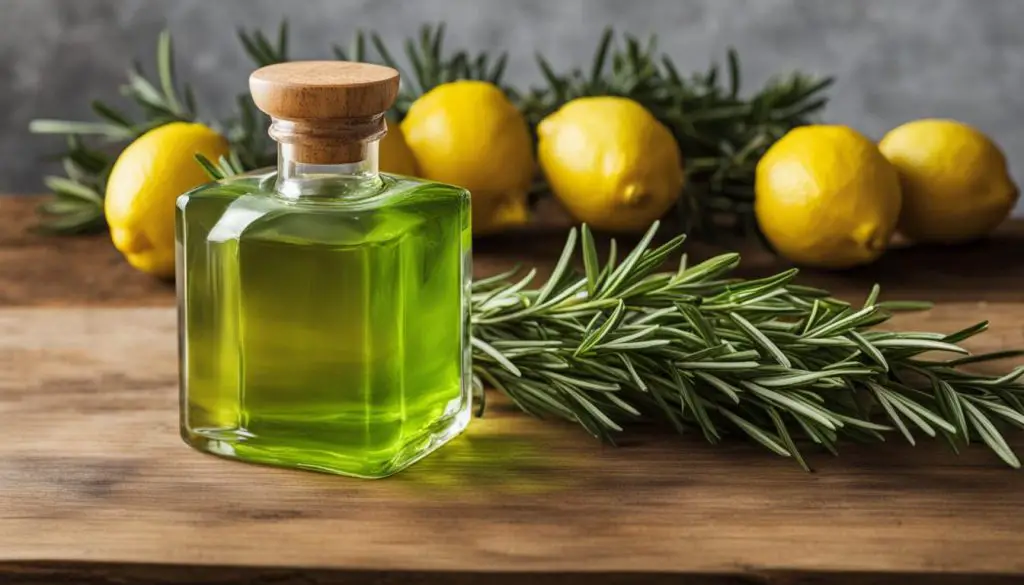
Ingredients
- Vinegar
- Rubbing alcohol
- Dish soap
Instructions
- In a spray bottle, combine equal parts vinegar and rubbing alcohol.
- Add a few drops of dish soap to the mixture.
- Shake well to blend the ingredients.
- Test the solution on a small inconspicuous area of your floor before applying it to the entire surface.
- If there are no adverse reactions, spray the cleaner onto the floor and use a mop or microfiber cloth to clean the surface.
- Rinse with water or a damp cloth to remove any residue.
- Allow the floor to air dry.
Homemade Wood Floor Cleaner
Wood floors require special care to prevent damage and maintain their natural beauty. Our homemade wood floor cleaner recipe combines the cleaning power of vinegar with the moisturizing and polishing properties of olive oil and lemon juice.
Vinegar is an excellent natural cleaner that helps remove dirt and grime from wood floors. Its acidity helps break down stubborn stains and residue. Olive oil acts as a natural conditioner, nourishing the wood and preventing it from drying out or becoming dull. Lemon juice not only adds a refreshing scent but also acts as a natural disinfectant, eliminating bacteria and germs.
To make a homemade wood floor cleaner, follow these simple steps:
- In a clean spray bottle, mix together 1 cup of white vinegar and 1 cup of water.
- Add 1/4 cup of olive oil to the mixture and shake well to combine.
- Squeeze the juice of one lemon into the mixture and shake again.
- Your homemade wood floor cleaner is now ready to use!
Tips for Using Homemade Wood Floor Cleaner:
- Before using the cleaner, sweep or vacuum the wood floors to remove any loose dirt and debris.
- Lightly spray the cleaner onto a microfiber mop or cloth.
- Gently wipe the mop or cloth over the wood floor, following the direction of the grain.
- Avoid saturating the wood with the cleaner to prevent damage.
- Allow the floor to air dry or use a dry microfiber cloth to remove any excess moisture.
Using our homemade wood floor cleaner regularly will help keep your wood floors clean, nourished, and looking their best. Say goodbye to harsh chemical cleaners and hello to a natural cleaning solution that is safe for your family and the environment.
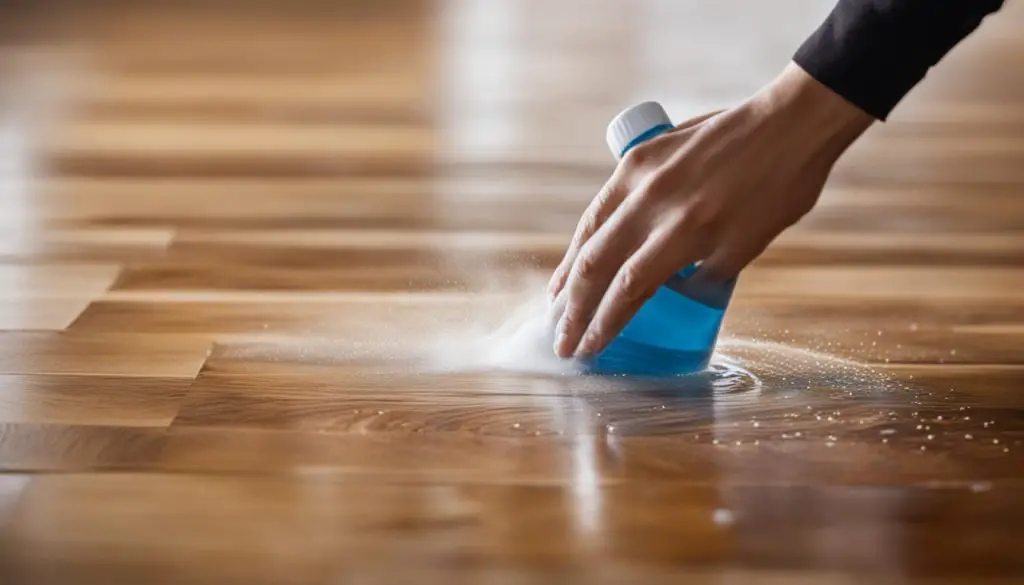
Conclusion
Making your own natural floor cleaners can revolutionize your cleaning routine. With the rise in popularity of eco-friendly and cost-effective options, homemade floor cleaner recipes offer a sustainable solution that not only benefits your home but also the environment.
FAQ
Why should I make my own natural floor cleaner at home?
Making your own natural floor cleaner is a cost-effective solution that is also safer and more eco-friendly than store-bought cleaners. It allows you to have control over the ingredients and avoid harsh chemicals that may be present in commercial products.
What ingredients do I need to make a homemade floor cleaner?
The key ingredients for making a homemade floor cleaner include water, vinegar, baking soda, borax, ammonia, rubbing alcohol, dish soap, olive oil, lemon juice, and essential oils.
Can I use a homemade floor cleaner on all types of flooring?
Yes, depending on the recipe, a homemade floor cleaner can be used on various types of flooring, including tile, wood, laminate, vinyl, and linoleum. Just make sure to use the appropriate recipe and follow the instructions accordingly.
Is vinegar safe for wood floors?
Yes, vinegar is safe for most wood floors when used in moderation and properly diluted. However, it’s essential to avoid using vinegar on floors with wax, as it can strip away the wax coating.
How often should I clean my floors with homemade cleaners?
The frequency of floor cleaning depends on factors such as foot traffic and personal preference. Generally, it is recommended to clean high-traffic areas at least once a week and other areas once every two weeks to maintain cleanliness and freshness.
Can I customize the scent of homemade floor cleaners?
Yes, you can customize the scent of homemade floor cleaners by adding a few drops of your preferred essential oils. This allows you to enjoy a pleasant aroma while cleaning.
Are homemade floor cleaners as effective as store-bought ones?
Yes, homemade floor cleaners can be just as effective as store-bought ones, especially when used correctly. The key is to use the right ingredients and follow proper cleaning techniques for each type of flooring.
What are the advantages of using homemade floor cleaners?
Homemade floor cleaners have several advantages. They are more affordable than commercial cleaners, environmentally friendly, customizable, and can provide a safer alternative for homes with children and pets.
Can I store homemade floor cleaners for future use?
Yes, you can store homemade floor cleaners in labeled and properly sealed containers. It is important to check the expiration dates of the ingredients used in the recipe and discard any cleaners that show signs of spoilage or change in consistency.
Are there any precautions I should take when using homemade floor cleaners?
When using homemade floor cleaners, it is essential to wear appropriate protective gloves and clothing, especially when handling ingredients like vinegar, ammonia, or essential oils. Additionally, always test the cleaner on a small inconspicuous area of your floor before applying it to the entire surface.

